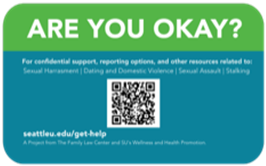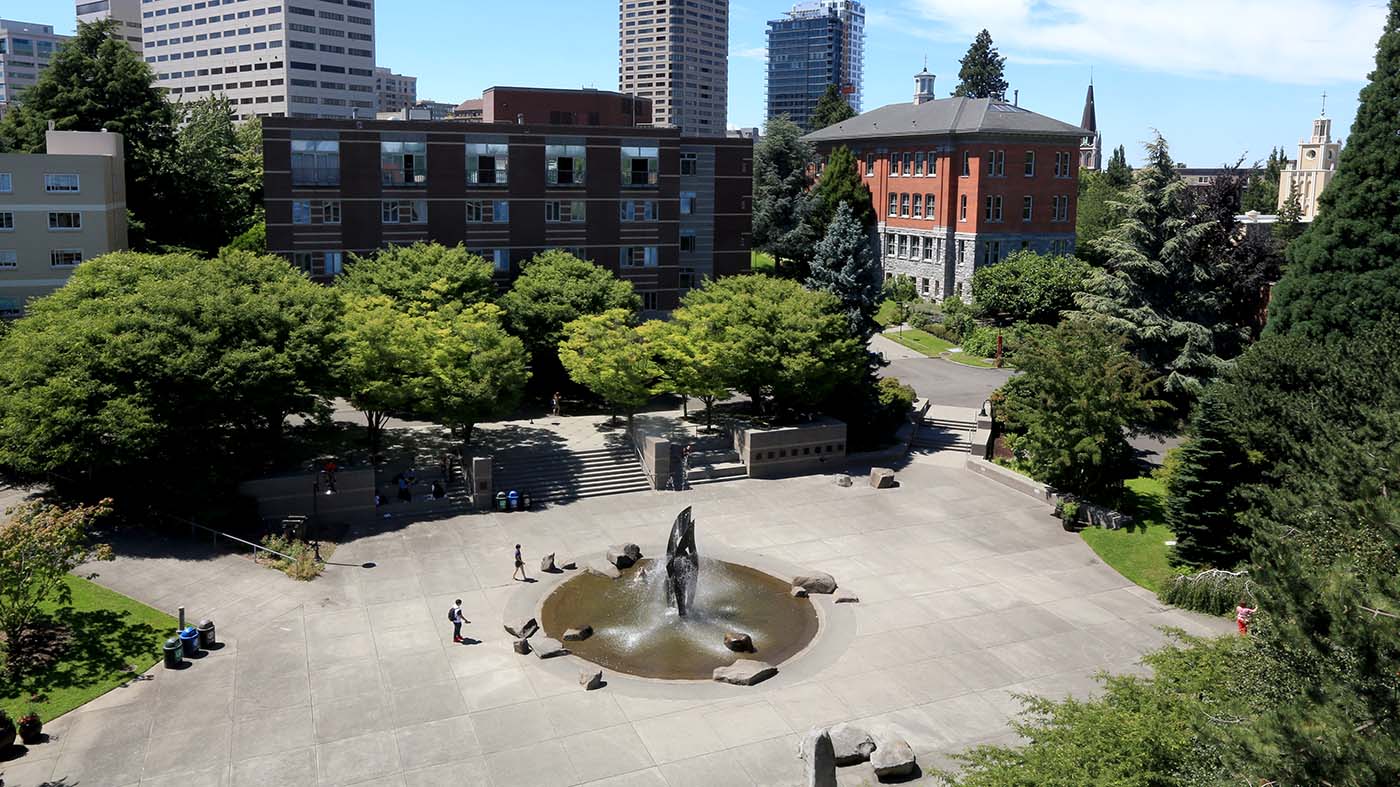For the first time, campus community can obtain protection order filing assistance from Seattle U Law’s Family Law Center
For Sexual Assault Awareness Month in April, Seattle University School of Law’s Family Law Center has launched a campaign to raise awareness of campus resources available to help survivors of sexual assault and domestic violence.

The centerpiece of the campaign is a sticker placed in all bathroom stalls across campus. With a headline that reads “Are You Okay?,” the stickers contain a QR code which quickly directs people in need to a web page with a range of campus resources. For the first time ever, students, faculty, staff, and members of the community can get campus-based help for filing protection orders from their abusers, provided by the Family Law Center.
“With this effort, we hope to create greater awareness of how pervasive the problem of intimate partner violence is. It allows people, especially our students, to know that there is a solution available to manage, if not escape, the situation,” said Deirdre Bowen, a professor of Law and the Moccasin Lake Endowed Chair in Family Law at the law school who serves as the Center’s director.
During the pandemic, when rates of sexual assault and domestic violence climbed precipitously, Bowen created a clinic with her law students to help survivors obtain protection orders. Based on this work, the Moccasin Lake Foundation donated $5 million — the largest single gift in the law school’s history — to establish the Center, so Bowen could expand upon these efforts on a more permanent basis. Although rates have decreased as the pandemic has subsided, they are still elevated compared to pre-pandemic levels.
The idea for the sticker campaign came about when Bowen was traveling through San Francisco’s airport, where stickers were posted in bathrooms aimed at victims of human trafficking. Something similar could work on Seattle U’s campus, she thought.
“It might seem little, but having these stickers in bathroom stalls is crucial. They are a space where survivors are guaranteed to be away from their abusers. And given that there is so much stigma around sexual assault and intimate partner violence, it is a way for survivors to find help without the risk of someone seeing them,” she said.
Students can be particularly vulnerable, Bowen said, since their youth often means they lack sophistication or awareness of their situations. “We know that at the beginning of each school year, we see a spike in dating violence and sexual assault. The situation can feel scary and overwhelming. That’s why we want survivors — be they students or anyone else — to know that even if their abusers are on campus, protections orders are available. And the Family Law Center is here to help secure them,” she said.
A unique feature of the Family Law Center’s outreach is the role of Seattle U Law students. Under the supervision of licensed attorneys and Bowen, they interview survivors to gather relevant information and to establish fact patterns that can be used to secure protection orders, and then help to prepare documents that are filed in courts. The work provides valuable training, with many on track to practice family law and domestic violence law when they graduate.
Third-year law student Mary Bent has found that helping survivors of sexual assault and domestic violence takes a unique skillset that goes beyond knowing the law.
“You really need compassion and empathy and grit to do this work. You can’t treat survivors like any other client. Otherwise, many of these men and women, who experienced unbelievable physical and emotional trauma, would never reach out for help. It’s gratifying when they understand that there is someone here who can empathize with them and help them get the justice that they need and deserve,” she said.
The filing assistance is open to Seattle U students, faculty, and staff as well as anyone in the community. If you or someone you know needs help filing a protection order, visit Seattle U Law’s Family Law Center website for more information.

